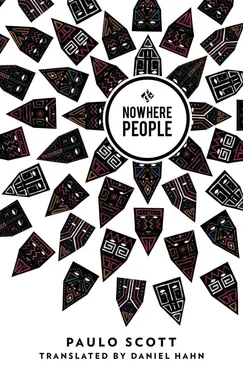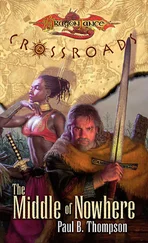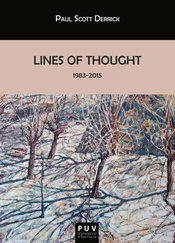Henrique sent the other team, which Luisa christened the B-team, to the western part of the state, a total of five people in a diesel camper van just like this one in which they’re travelling as a foursome right now. Luisa insisted on operating the camera herself so that there would be free seats in the van: one of the interns would handle the sound and the Indian they would find and invite to join them would help the second intern with the data collection. After a while, they would meet up with the B-team in Iraí, almost on the Santa Catarina border. That’s what was agreed.
The camper van leaves Morro Santana (one of the hills that make up the so-called Porto Alegre Crest, the chain of hills comprising Morro Santana, Morro da Companhia, Morro da Polícia, Morro Pelado, Morro da Pedra Redonda, Morro Teresópolis and Morro do Osso), where the Kaingang gather guiambê vines for their handicraft work, a region that has been threatened by growing property speculation. They take Avenida Protásio Alves until they are beyond Porto Alegre and then drive on to the roadside encampment where the Indian girl lives about whom the doctor talked so much. There are Indians who have become civilised, accepting the rules and organisational structures of the non-Indians, but there are also those who claim to be wild, the ones who, living near the cities or even within them, consider themselves at war with the invaders. Luisa understands that there is no other way to face the facts, that there is no point marking out territories or getting help from well-meaning NGOs and government officials; the disputes over land never end. She was disgusted when she heard about the case of the chief who tried to lease out indigenous lands for his own private gain. She is besotted by this subject; Henrique has already told her that the audiovisual survey might not yield all that much if she isn’t able to separate her particular enthusiasms from the work they’ve set out to do, it’s vital to remain alert to everything and not to become attached to one particular problem or other. All the same, he has agreed to amend one day of their itinerary, since it’s easy enough to get to the encampment where this Indian girl lives.
With her hair cropped short (Luisa had never seen this on an Indian woman before), she does not seem too friendly when, after they have looked at the baskets and fans of local bamboo hanging from the improvised beams, dry sticks stuck at an angle into the earth and tied with vines close to the hard shoulder, they ask her whether her name is Maína. There is no one else to be seen in the encampment. Maína asks them what they want. Henrique introduces himself and explains the survey work they are doing, Luisa then takes over and asks whether they might film an interview with her, she explains that they heard about her from the doctor who looked after her during her pregnancy. Maína, her expression still serious, tells them to leave the camper van just where it is and come inside. As though they had been waiting for just the right moment, three children emerge from the tent, come to meet the visitors. The oldest, quite a lively girl, appears with a smile and asks whether they have brought them any gifts. Luisa tries to stroke her head, but she dodges her and runs off towards the van, the younger girl follows her, and the boy, who doesn’t look like he can be more than three years old, stays behind. Maína takes the boy in her arms and, still looking quite unfriendly, asks whether they would like a lemongrass tea. Luisa accepts and notices that round the back there are foundations supporting a wooden floor that looks as though it used to be part of a house, and now resembles a giant table. ‘What used to be there?’ she asks. Maína replies that it’s a stage for performing Russian ballet. Luisa doesn’t know how to handle that response, she walks ahead without saying any more and climbs onto the structure, gesturing to Henrique to come join her. The two girls are entertaining themselves with the interns, escorting them as they unload the tripods, the cases with the two Sony Betamax cameras, the microphones and audio recorder. Maína says to make themselves comfortable, she goes into the tent. Henrique climbs the steps and stands beside Luisa looking out towards the west. ‘What do you reckon this was? What do you think of her?’ Luisa asks. ‘Take it easy, Luisa.’ Henrique taps the floor with his foot, testing to see how firm it is. ‘Shall we record up here?’ Luisa suggests. ‘I don’t know, it does seem a bit unusual here,’ he replies. Luisa comes down, walks over to the tent, asks permission to enter, and goes in. Inside she finds Maína’s mother, who greets her saying that the tea will be ready in a few minutes, and an unclothed Maína arranging strings of beads and seeds around her neck and her waist. Luisa tells her there’s no need to do herself up, that it’s only going to be a quick chat about what she thinks about her situation, about being there on the roadside, and about what she thinks of the situation for Indians who live like them. ‘I’m an Indian girl, miss, Indians go naked … I don’t have any problem being filmed like this,’ she says, looking straight at Luisa. ‘If you could make one request that I would be able to grant you,’ Luisa says, ‘what would you ask for?’ ‘Financial support, a study scholarship with a place in a student house where I’d live as a student studying in a state university.’ Luisa is impressed at the Indian girl’s fluency. ‘Very good. It’s a nice choice, it’s a dream worth having,’ she says in a sisterly tone. ‘I don’t know how to deal with dreams, miss … Indian dreams are different from you people’s … It’s not right to play at dreaming, like it’s not right to play with promises. A few days from now I’m going to be eighteen and, however much I read and however hard I try, I still haven’t been able to understand the world you live in, I still haven’t found the door to get in … A scholarship to study would solve my problems and those of my family … I’m not going into the city to work as a maid, I’m not going to be a whore … I’d rather stay here selling my craft things, taking care of my son, of my mother, of my sisters, waiting for handouts from the government and people like you, coming here to play nice with us … ’ Luisa raises her hand in a gesture to stop. ‘Put on your clothes, there isn’t going to be an interview.’ Maína’s mother, who has had her back to the two women, turns towards them. ‘I’ll make you a proposition. Why don’t you join us for a month? We need another assistant. I think it would be quite an opportunity. We’ll give you food and lodging and we’ll even pay twice the minimum wage. We’ve got to go to a place called Fazenda da Borboleta up near the source of the Jacuí, we need to get some notes that only the researchers up there have got, that’ll take us a day, and on the way back we can come by here again to find out what you think and what you’ve decided,’ says Luisa. ‘I don’t need to think. I accept,’ is Maína’s reply. At that moment her mother asks Luisa to go outside. Seeing what this means, Luisa (barely thinking about it, and as has increasingly been her way of doing things lately) jumps in. ‘We can find someone to stay here with you and the children while Maína is with us.’ Maína’s mother thanks her with a shake of the head and, looking sidelong at the visitor, once again asks Luisa to go outside. Now Luisa does. Maína’s mother walks over, tells her to listen in silence to what she has to say. There is no room for any more adventures and if Maína wants an adventure with these people who have appeared out of nowhere she can go, but she’s taking her son with her. To each her own burden (she used an expression very like this). She would manage with her two sisters, she will always be able to rely on help from the people who live in the neighbouring encampments. Maína has never been apart from Donato, the way her mother has understood things this is going to happen for the first time; although it was not clear from the answer she gave the visitor a few minutes earlier, parting from Donato is not what Maína has in mind. She takes off her necklaces and the strings around her waist and gets dressed. Anyone who says that a person controls the things her head devises is lying; it is possible to choose what you want, but not the time nor the way in which things around you will happen. Maína has learned to be patient, but she has become bitter, too, for her this is that thing they call growing up. She thinks, and she worries: she doesn’t know what they will say when she asks for her son to go with her. She will assure them that he’s well behaved and placid (she must remember to use that word) and that he never cries or gets in the way, which is true. It’s the chance she’s been waiting for. If there are benefits, she will not be the one to get them. Children behave in a peculiar way. Children don’t remember too much. Maína does not yet know what her son needs. Maína needs to give him the chance to choose, even if this takes a while. Donato will come with her, he’s a good child (she must remember to say that he is placid). They must accept, they have to accept.
Читать дальше












